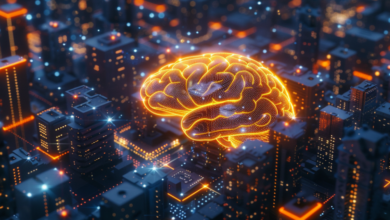AI in CRM: 5 Ways AI is Transforming Customer Experience

In today’s digital world, delivering a robust customer experience has become an integral part of every business, with hyper-personalization becoming the new standard.
Nearly every company offers a digital product these days, and organizations strive to deliver a seamless customer experience at every touchpoint along the customer journey.
CRM platforms are efficiently designed to meet these customer service-related needs. Moreover, modern CRM systems also use artificial intelligence (AI) to enhance the functionalities of CRM tools.
According to recent Customer behavior statistics91% of companies use AI in their CRM systems, and 42% have already implemented AI in their CRM strategy.
In this article, we will see how AI is transforming CRM platforms and why it has become necessary to adopt it.
The need for AI in CRM
Customer expectations are at an all-time high and they expect seamless personalization of their experience at every touchpoint. However, as data grows, managing and acting on it will become more complex.

AI in CRM platforms is being deployed to address these data-related complexities. AI ingests and analyzes massive amounts of data in real time to predict customer needs. The powerful synergy of AI in CRM platforms improves overall business operations and helps build stronger customer connections.
Traditional CRMs have limitations when it comes to collecting data and managing external workflows. They provide insights based on data that is manually integrated and often adjusted.
On the other hand, AI-powered CRMs are faster and provide actionable insights based on real-time data. The data collected is more accurate, leading to better customer information. On an operational level, it enables data democratization and ensures data management.
5 key ways AI is transforming CRM
Integrating AI into CRM systems has become a secret weapon in increasing customer engagement and retention. Companies using AI-powered CRM tools see a 29% increase in turnover.
Let’s take a look at how AI is transforming customer relationship platforms.
Personalized customer experience
AI-powered CRMs provide deep customer insights and predict customer behavior using predictive analytics techniques. With a deep understanding of leads and conversions, intelligent CRM proposes personalized customer recommendations based on their preferences.
Plus, all this information about customer preferences allows sales and marketing teams to accurately target customers.
Routine Tasks Automation
AI CRMs are designed to automate routine tasks such as customer behavior analysis, data entry, customer follow-up emails, delivery status, sales entry, etc. Automation saves time while allowing teams to focus on strategic planning and innovation.
With real-time customer interactions and automated responses, companies can also reduce the risks associated with manual procedures. Moreover, companies use it AI-driven CRM tools show a 29% increase in sales and a 25% increase in customer satisfaction.
By using machine learning algorithms, companies can prioritize leads, schedule follow-ups, and handle customer service queries accurately.
Improved analytics
AI in CRM platforms can take analytics to new heights. By using ML and natural language processing (NLP) techniques, CRM platforms can collect raw data from various sources, such as purchasing patterns, customer interactions, purchasing behavior and purchase history.
Data from all these sources, combined with predictive capabilities, generates unparalleled analytics. These enhanced analytics allow companies to target their customers more accurately, allowing companies to:
- Optimize marketing campaigns
- An in-depth investigation into business statistics, such as
- Proactive customer service strategy
Better sentiment analysis
Sentiment analysis should be a top priority when choosing an AI-based CRM. It uses the power of NLP techniques to analyze the customer’s tone, urgency level and intent.
When it comes to customer service, sentiment analysis plays a crucial role.
Zoho CRM’s AI assistant, Zia, analyzes customer emails and chat messages and segments them into positive, negative and neutral. Once a negative customer tone is detected, the message is prioritized so the support team can resolve the issue quickly.
Moreover, this capability also improves overall customer retention and resolves pain points proactively.
Continuous improvement
AI-based CRMs can process large amounts of data continuously. They are always learning based on real-time data ingestion from various touchpoints, allowing companies to proactively refine their customer retention strategies.
By using ML algorithms, organizations can optimize their processes and drive continuous improvements in customer relationship management.
Challenges of AI in CRM Adoption
Integrating AI into CRM brings new ways to handle customer relationships, but its integration comes with some obvious challenges that can hinder performance.
Therefore, it is necessary to address these roadblocks. Some of the difficulties organizations face while adopting AI CRMs may include:
Data privacy and management
AI-based CRMS works on large amounts of data collected across multiple customer touchpoints. Therefore, data privacy concerns can arise at any stage. However, relevant compliance and data governance policies must be in place to address data privacy concerns.
Data quality and integration
AI-based CRMs require robust data integration tools to be integrated with a supporting underlying infrastructure. Without the availability of quality data, investments in AI CRM initiatives will not yield the expected results.
Therefore, data pipelines and the underlying infrastructure must be able to support AI-based CRMs.
Engage training and resources
AI-based CRMs are expensive initiatives, so using them effectively should be a top priority. However, insufficient training and resources can lead to wasted investments.
To prevent this, companies should organize extensive training of employees to improve skills and gain new knowledge to optimally use AI systems.
The future of AI in CRM
Today, customer interaction is more than a call center initiative. AI-powered CRMs can deliver hyper-personalized and efficient solutions in real-time by anticipating customer needs through predictive analytics.
Additionally, teams can accelerate trend identification, problem resolution, and sales optimizations with AI systems.
Visit unite.ai for the latest trends in AI, CRMs and the latest technology.






